The debate about how many people should be allowed in the UK has once again been propelled to the forefront of British debate, following the release of Britain's migration figures, which revealed that net migration had increased to 290,000 — roughly 50,000 more than the levels in 2010.
The release of these figures sparked widespread criticism of David Cameron's government, who made a "no ifs, no buts" pledge to reduce net migration during their term in office.
Anti-EU party UKIP, who base their policy on tightening immigration controls, were among the most vocal critics of Mr. Cameron, with UKIP's migration spokesperson Steven Woolfe saying the government "should be ashamed of its abject failure."
New @thetimes poll: 63% of voters think the govt. has lost control of immigration and 75% believe it is too high http://t.co/wpzYqNiCDF (£)
— migrationwatch (@migrationwatch) March 2, 2015
The release of the government figures was followed by UKIP's announcement, calling for the introduction of a points based visa system as part of their pledge to cut immigration in Britain, further sparking debate over what is considered the best strategy towards migration in the UK.
It has been widely accepted among political commentators that UKIP's increased support for tougher immigration controls has influenced Britain's major political parties — the Conservatives and Labour — in their approach to the issue.
However, despite these efforts, it seems there is still some dissatisfaction with the approach of the major parties.
Tories Close to Chaos, Labour Doesn't Understand
Advocacy group Migration Watch, who believe in a reduction in the UK's immigration intake, have been particularly critical of the current government's handling of migration matters, saying that current numbers had "run out of control" and that the current system was "close to chaos".
However, far from endorsing the country's main opposition party, Migration Watch today released a scathing report of immigration figures under the former Labour government, who were in power between 1997 and 2010.

The report stated that Labour allowed the "mass immigration" of 3.6 million people to Britain during their time in office, while the group accused the former leadership of "fundamentally undermining" the credibility of the asylum system by removing only a third of people who were refused refugee status.
The report went on to state that along with previous Labour leaders, there was "no sign that the present Labour leadership understands public opinion about the scale of immigration.
Nor is there evidence that they have any serious intention of controlling it".
The group criticised the approach of Labour and other pro-immigration groups such as the Greens, who they say "wanted to change the whole nature of our society by making it much more multicultural".
Lord Green of Deddington, Chairman of Migration Watch UK, said: "This is a fascinating but very sad story of how a small but determined group appear to have manipulated immigration policy while deterring any opponents with false allegations of racism.
"There is nothing to suggest that Labour now have the political will to get the scale of immigration down to a sensible level, rather the reverse.
"Whatever the Labour leadership may be saying now, the pressures from pro-immigration groups in and around any future Labour government would very likely lead to the gates being thrown open once more."
Public Cynical of Mainstream Parties
However it's not just those calling for tougher immigration controls that have accused Britain's political mainstream of being out of touch with public sentiment, with a number of pro-migration groups critical of the increased prominence given to the immigration debate.
Advocacy group Migration Matters are among those critical of the political representation of immigration, and who have encouraged an honest debate on migration, citing both the potential benefits and potential drawbacks.
From 1997-2010 Labour let in 7.23 million immigrants, 1 every minute of everyday for 13yrs http://t.co/SC8Nvg2uvZ
— David Jones (@DavidJo52951945) March 5, 2015
The group try and "bust the myths" associated with the migration debate. Citing government figures, Migration Matters say the belief that migration places a strain on the economy is false, claiming that the UK's GDP is actually boosted by migration, while immigration levels in the UK are much lower than many other countries in Europe.
Barbara Roche, chair of the group says that parties need to stop pandering to media hype and state the facts when it comes to immigration.
"The public is already cynical about the mainstream parties' policies on immigration and committing to unachievable targets makes matters worse."
"It's time to be straight with the public on two counts."
"First, if you believe we should stay in the EU, then freedom of movement is here to stay, which means immigration is likely to rise as our economy does well compared to the rest of the EU. Second, and this is the real taboo, this migration is overwhelmingly good for Britain, plugging skills gaps, boosting output and bolstering our recovery."
As the immigration debate continues in the lead up to May's election, it is clear that there is a significant divide in British opinion towards immigration, and that the country's major parties seem to be stuck somewhere in the middle.





